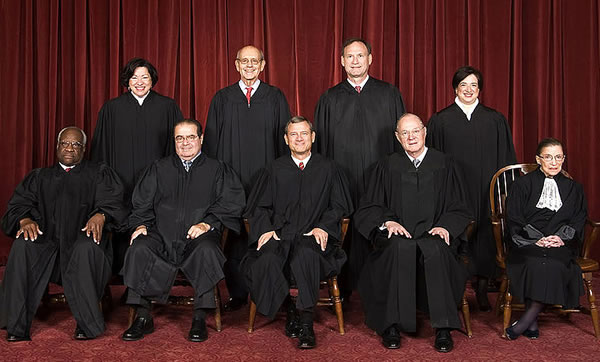

Share
For Jesse Busk and Laurie Castro, it’s all a question of overtime pay. And that landed their case against a Nevada staffing firm before the U.S. Supreme Court on Wednesday.
Busk and Castro formerly toiled in two Amazon.com warehouses in Nevada, but the monster retailer didn’t hire them. A contractor, Integrity Staffing Services, Inc., which ran warehouses for Amazon, did. And one of its requirements, following Amazon’s orders, was to force all workers to undergo security checks at the end of each workday, after their shift ended.
Workers at other facilities, from construction workers building airports to nuclear power plant employees, also undergo such security checks. Lower courts have split on whether the federal Portal-to-Portal Act, which amended overtime pay law, covers those security checks.
Busk and Castro – who don’t work at the warehouses any more – and their colleagues waited an average of 25 minutes each every day to go through the security checks, to make sure they didn’t take anything, their attorney, Mark Thierman of Reno, told the justices.
Think of an airport screeners’ check, of emptying your pockets, taking off your shoes, removing your belt, but waiting 25 minutes to do so, he explained.
And they wanted to get paid for the time. Integrity didn’t want to pay them, especially overtime. It also didn’t hire more checkers. The wait meant a lot, Thierman told reporters afterwards, since the warehouse workers then made just above $8 an hour.
“The only thing these workers have to sell is their time,” he added.
“Busk was exhausted” after a day of moving Amazon’s merchandise and the long wait, Thierman told reporters. “They micromanaged him to a fare-thee-well. No wonder he’s got another job,” as a boxing instructor, now. The lawsuit started four years ago.
Thierman painted that picture for the justices in the hour-long court session, pointing out repeatedly that making Busk, Castro and their colleagues wait and wait and wait and then go through the security check was an “integral” and “principal” part of their job. That’s because the employer required it, even if it was after the workday officially ended. So they should be paid for that wait, he said.
“This is about working off the clock. That’s what this case is all about,” he told Justice Stephen Breyer.
“Their overall function is to move merchandise” in the warehouse “without losing it,” Thierman told Breyer. That’s their “principal” activity “where a person is hired to do what you’re told to do. They’re told they have to return their tools, check out – and 20 minutes after that, they have to be searched.” Not paying them for the time spent in the search “is just wrong.”
Justice Antonin Scalia was the most-skeptical of Thierman’s defense for the workers. Scalia compared the security screening time to time workers spend punching in and out on time clocks – and don’t get paid for that. “You have to go through the security screenings to get to the (warehouse) exit doors,” Thierman responded to Scalia.
Justice Elena Kagan pointed out that not just warehouse workers go through security checks at the end of their workdays. Bank tellers, casino cashiers – the case came from Nevada, after all – and others must undergo the checks, too, she said.
And those workers don’t get paid either for the time spent on the security checks, Thierman said. There is one exception, he admitted to reporters outside the court afterwards: UPS drivers. They go through end-of-the-day security checks, too. But they’re covered by the Teamsters’ union contract, and the union got a provision in to pay them for the check time.
“All of this is subject to collective bargaining,” Chief Justice John Roberts observed during the court session. “Workers can always insist on a higher wage” to cover the unpaid time spent in security checks, he added. “They’re (employers) are non-union. There are only five or six cases of this type in the last 10 years and they’re mostly non-union,” Thierman said.
“But it is a requirement that the employer tells you to do it” – the security checks – “that makes it integral and indispensable to job” under the Portal-to-Portal Act, he told Roberts. And workers must be paid, that law says, for tasks that are “integral and indispensable.”
Company attorney Paul Clement – a former top Justice Department official in the George W. Bush administration – compared the security screenings to “checking out and checking in” and said the workers shouldn’t get paid. “Couldn’t you say that (a cashier) closing down a cash register is part of the job and getting inspected isn’t?” Scalia asked Clement. “Yes, you could,” the lawyer replied. “But saying so makes it easier.”
Business groups, led by the Chamber of Commerce, and the Democratic Obama administration sided with the company. The administration’s attorney, Curtis Gannon, said the Labor Department issued advisory rules in the late 1940s on what the Portal-to-Portal Act covers, and what it doesn’t and the administration seeks to uphold those rules.
The AFL-CIO filed a friend-of-the-court brief supporting the workers. The court did not allow the labor federation to participate in the Oct. 8 session.

